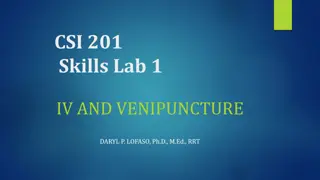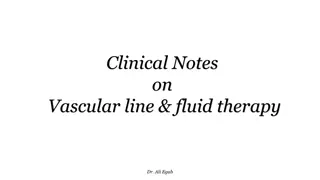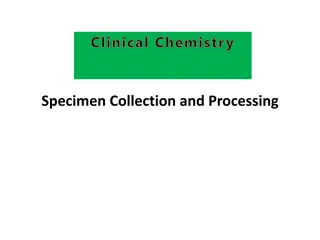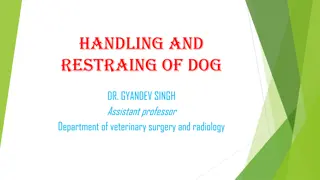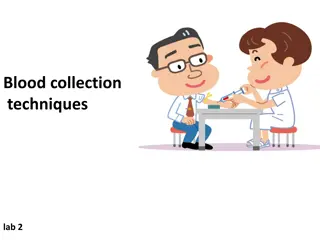Essential Guide to IV Procedure and Venipuncture Techniques
Learn about indications for IV access, common IV sites, IV catheter sizes, steps for performing IV procedures, risks of needle sticks, and measures to prevent them. This detailed guide by Daryl P. Lofaso, Ph.D., M.Ed., RRT provides valuable information on safely and effectively administering IV medi
0 views • 15 slides
Clinical Notes on Vascular Line & Fluid Therapy by Dr. Ali Egab
This collection of clinical notes by Dr. Ali Egab covers various aspects of vascular access, types of veins used for IV therapy, considerations in vein selection, equipment for IV therapy, cannula gauge, rate of infusion, and local complications of vascular lines. The notes provide valuable insights
0 views • 22 slides
Proper Clinical Chemistry Specimen Collection and Processing
Proper collection, identification, processing, storage, and transport of various types of biological specimens are crucial for obtaining accurate diagnostic test results. Different types of specimens, such as whole blood, serum, plasma, urine, feces, saliva, and various bodily fluids and tissues, ar
0 views • 18 slides
Dog Handling and Restraint Techniques in Veterinary Practice
Learn about the importance of proper handling and restraining techniques for dogs in veterinary settings, including physical equipment like shock collars, noose leashes, muzzles, and Elizabethan collars. Discover different restraining positions for procedures like venipuncture and understand the pot
0 views • 12 slides
Comprehensive Guide to Blood Collection Techniques in Medical Investigations
Blood collection is a crucial process in medical investigations where blood is withdrawn from patients for analysis. Methods include arterial sampling, venipuncture, and fingerstick sampling, each serving specific purposes. Venous blood is preferred over arterial blood due to accessibility and ease
0 views • 10 slides
